The iPhone 5 Review
by Anand Lal Shimpi, Brian Klug & Vivek Gowri on October 16, 2012 11:33 AM EST- Posted in
- Smartphones
- Apple
- Mobile
- iPhone 5
Six Generations of iPhones: Performance Compared
Section by Anand Shimpi
Cross platform smartphone benchmarks are interesting, but they do come with their own sets of issues. Before we get to that analysis however, let's look at how the iPhone's performance has improved over the past six generations. Luckily Brian has a set of all of the iPhones so he was able to run a few tests on all of the devices, each running the latest supported OS.
We'll start with SunSpider 0.9.1, our trusty javascript performance test:
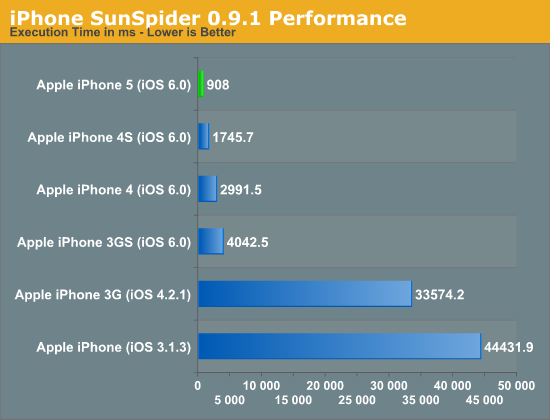
The transition from iPhone to iPhone 3G shows you just how much additional performance you can squeeze out of simply a software change. There's likely even more that could be squeezed out of that ARM11 platform, unfortunately newer versions of Safari/iOS aren't supported on the iPhone 3G so we're left with a runtime that's around 37x the length of a single run on the iPhone 5.
The rest of the devices support and run iOS 6, so we're at least on a level software playing field. The performance boost from one generation to the next is quite significant still. Going by this chart alone, the best balance of minimal upgrades and maximum perceived improvement would be from the original iPhone to the 3GS then again from the 3GS to the 5.
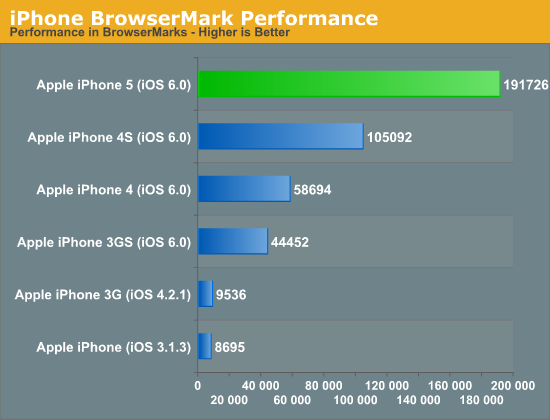
The BrowserMark results tell a similar story. The jump from the ARM11 based iPhone/iPhone 3G to the 3GS running iOS 6 is huge. Both the 4S and 5 offer doublings in performance, albeit for different reasons. The 4S delivered a doubling thanks to a doubling of core count and a move to the Cortex A9, while the iPhone 5 doubled performance through a much higher clock speed and microarchitectural improvements.
Finally we have Geekbench 2, which only runs on the iOS 6 supported devices so we say goodbye to the original iPhone and iPhone 3G:
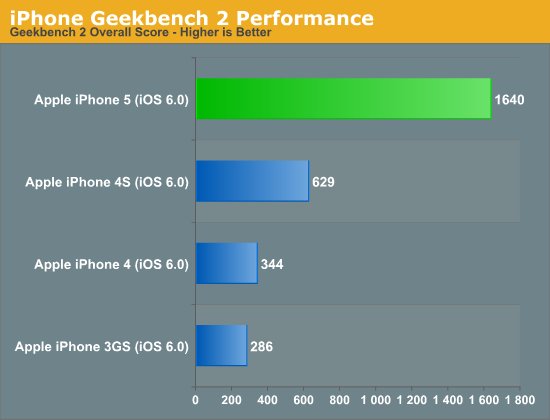
None of the jumps looks as dramatic as the move to the iPhone 5, but we already know why. The Swift CPU architecture does a great job improving memory performance, which shows up quite nicely in a lot of the Geekbench 2 subtests.
On the PC side we often talk about 20% performance improvements from one generation to the next being significant. It's clear that the mobile SoC space is still operating along a hyper Moore's Law curve. The rate of progress will eventually slow down, but I don't see that happening for at least another couple generations. The move to ARM's Cortex A15 will be met with another increase in performance (and a similarly large set of power challenges), and whatever comes next will push smartphones into a completely new category of performance.


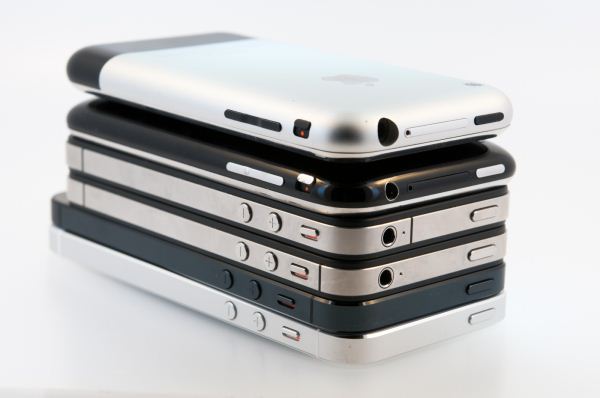
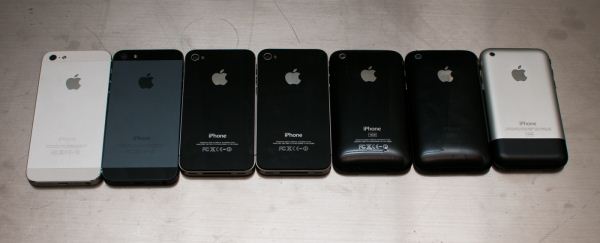








276 Comments
View All Comments
youwonder - Wednesday, October 17, 2012 - link
I find it kind of ...odd that the S3 has a much larger battery than the one X and the same SoC yet posts significantly worse LTE browsing numbers, and is the only phone using LTE to get worse results with it than using 3G(granted that is the international vers, doesn't look like they had time to do testing on the AT&T or verizon variant running 3G). Does the samoled screen really draw THAT much more power than an LCD? also there's this which makes me wonder more:http://blogs.which.co.uk/technology/smartphones/be...
Of course, I don't respect these guys as much as anandtech when it comes to accurate results, and they did things much differently (broadcasting their own 3g signal and putting all phones on max brightness), but still the odd results here make me wonder if a small mistake wasn't made.
Zink - Wednesday, October 17, 2012 - link
Max brightness gives the gs3 an advantage because its screen is so dim. The other phones are using LED lighting as well but they go much brighter and have to shine through the LCD panel.youwonder - Wednesday, October 17, 2012 - link
Good point, I guess it's mostly just me wondering why the GS3 LTE variant posts such horrible numbers even compared to it's 3G version when anand specs a good amount of time explaining why the opposite is true.phillyry - Sunday, October 21, 2012 - link
Don't know why but it does tank on LTE.rarson - Wednesday, October 17, 2012 - link
I'm getting so sick and tired of seeing the word "literally" injected into all sorts of sentences that it doesn't belong in. This word only needs to be used when describing something literal. It's not a synonym for "really" (not yet, anyway).andykins - Wednesday, October 17, 2012 - link
Alright, language purist. :Pjoos2000 - Thursday, October 18, 2012 - link
http://theoatmeal.com/comics/literallyphillyry - Sunday, October 21, 2012 - link
Great link. That's too funny - literally!dfonseca - Wednesday, October 17, 2012 - link
On the last page, section "Final Words" / "iPhone 5 Device Conclusions", it's written:> At a high level, the iPhone 5’s cameras appeared to be some of the least unchanged elements of the new device however in practice the improvements are significant.
"Least unchanged" means "most changed." It should probably say "most unchanged," or "least changed."
Nice review, kudos to all authors.
mattlach - Wednesday, October 17, 2012 - link
I had the original iPhone, followed by the iPhone 3G and then the iPhone 4, and just switched to a Samsung Galaxy S3 in July.When the original iPhone came out, while it was the first to do what it did - and that's why I bought it at its steep no-contract introductory price - it wasn't exactly revolutionary, everything in the market was moving in this direction, but it was pretty well executed and nothing else did it at the time.
I upgraded to the 3G on launch, as I thought the edge speeds were dreadful, but was disappointed, as the phone wasn't fast enough to take advantage of 3G, and AT&T's 3G was pretty mediocre anyway. It didn't get important features its competitors had, like copy and paste until very late in the game, and I started to think that I should have gotten an Android phone instead.
By the time I got the iPhone 4, I was tired of my slow 3G experience and just wanted an upgrade to something faster. The iPhone 4 was a good upgrade, but I really only got it because I didn't like AT&T's Android offerings at the time. I had been thinking about going to Verizon and getting an Android for some time. The 3G should have been my last iPhone, it was a mistake to buy the 4.
Having realized my mistake, I waited 2 long years with the 4 until I could finally get out of my AT&T contract and go to Verizon and get a GS3, and it felt great.
The additional freedom of what I run on my phone, not being controlled by Apple and their agenda as to what makes it into the App store, and the fact that I finally no longer had to have iTunes installed on my computer were fantastic.
My computer has been iTunes free for 3 months now, and it feels great!
I was concerned for a while that once the iPhone 5 was released, they would come out with something that would make me regret my choice of the GS3, but it turns out they didn't.
I'll likely never buy anything Apple again. It feels like a huge relief to say that.